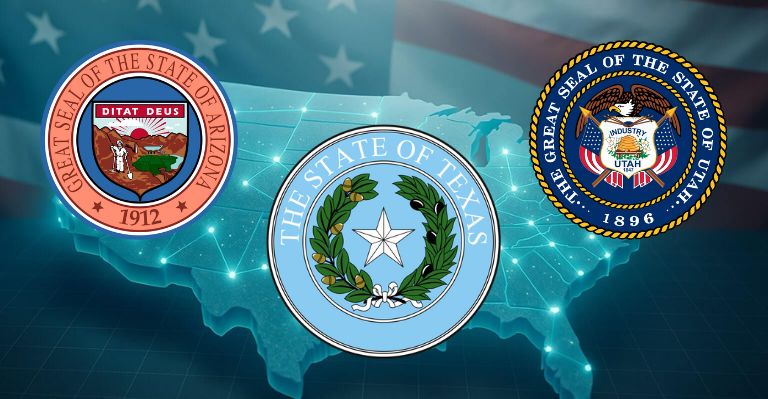TL;DR
- Arizona, Texas, and Utah top Chainlink’s “Tokenized in America” rankings by leading in blockchain pilot programs, pro-crypto task forces, legislative support, workforce hubs, and strategic Bitcoin reserves.
- As Washington kicks off “Crypto Week” with bills like the GENIUS, CLARITY, and Anti-CBDC acts, over half of U.S. states have passed blockchain-friendly laws, and a third have dedicated crypto task forces.
- Beyond the frontrunners, 22% of states run live blockchain pilots and 16% hold public Bitcoin reserves, creating localized investment incentives, tax breaks, and policy blueprints for digital-asset growth.
A recent report from Chainlink and the Blockchain Association names Arizona, Texas, and Utah as the country’s leaders in blockchain policy. These three states topped the “Tokenized in America” scorecard by excelling across government-led pilot programs, pro-crypto task forces, state congressional support, workforce concentration, strategic Bitcoin reserves, and membership in the North American Blockchain Association. Their combined strengths showcase how regional governments can spark adoption and regulatory clarity long before federal frameworks land.
2/ America is made up of 50 individual innovation laboratories. Today’s project launch with @chainlink, Tokenized in America, is a closer look at how that innovation is playing out. https://t.co/YKwOUgMQiA
— Blockchain Association (@BlockchainAssn) July 15, 2025
Statewide Momentum Amid Federal “Crypto Week”
The timing couldn’t be better. As Washington ushers in “Crypto Week,” with three landmark bills, the GENIUS Act for U.S. stablecoins, the CLARITY Act for digital asset markets, and the Anti-CBDC Surveillance State Act, state governments are busy laying groundwork on their own turf.
Over half of U.S. states now boast strong legislative backing for blockchain, while more than a third have active crypto task forces. This dual-front surge reflects growing political will to balance innovation with investor protections.
Beyond the Top Three: A National Map of Progress

Arizona, Texas, and Utah may lead, but they’re far from alone. North Carolina, California, New Hampshire, and Wyoming all scored highly for ecosystem development and policy engagement. Over 22% of states run live blockchain pilots, experimenting with supply-chain tracking, tokenized assets, and digital identity frameworks.
Another 16% have moved to secure strategic Bitcoin reserves, signaling a broader institutional shift toward considering BTC as a public-policy asset.
Insights and Implications for Investors and Policymakers
Chainlink Labs’ Head of Policy, Adam Minehardt, emphasizes that state innovations often outpace federal action and offer vital insights into real-world digital asset challenges. For investors, this state-by-state dynamism creates pockets of opportunity, from pilot incentives in Utah’s energy sector to tax breaks for tokenized projects in Arizona.
For policymakers, it highlights successful blueprints: cross-agency task forces, public-private consortia, and clear legal frameworks. As states learn from each other, the U.S. is steadily weaving a more resilient, competitive foundation for the future of finance.

